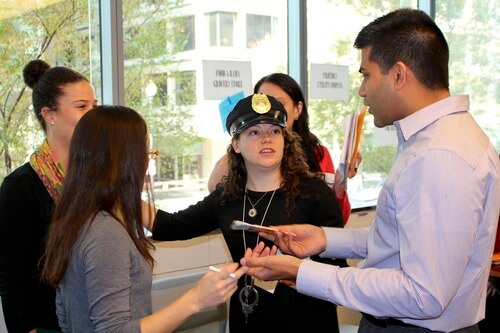
2013 Poverty Simulation: A Recap
by Cheryl Polydor
“I felt beaten down.” “I felt humiliated.” “I felt like my entire life was spent filling out forms and standing on lines.” “I felt powerless.” That’s a sampling of the comments made by this year’s Poverty Simulation participants, after spending a morning enacting the role of a person living in poverty in the United States. The three-hour interactive program, originally developed by the Missouri Community Action Association, gave participants a taste of the day-to-day reality of dealing with landlords, employers, store owners, social workers and legal aid lawyers who held the participants’ fate in their hands.
The program was facilitated by attorney and social justice activist Tiela Chalmers. A group of about 50 lawyers and students were on hand to play the roles of low-income working families, undocumented individuals. senior citizens, single parents, and others living in poverty – as well as the representatives of a system that often felt arbitrary, oppressive, and just plain broken.
Transportation passes were required to go everywhere – even to the office where the transportation passes were distributed; if you ran out of passes for the month, you were out of luck, even if you needed one to visit the doctor, the legal aid bureau, or the unemployment office. Landlords and bankers gave incorrect or incomplete information to struggling families who might have avoided eviction and remained in their homes if they’d been fairly informed of their options. The police seemed to be unfairly targeting people in the community, while being slow to provide help when it was actually needed.
Participants were visibly moved by the program, and some said they were inspired to work on ways to change the way the system works – or doesn’t work – for people and communities living in poverty. Chalmers encouraged us to continue to see beyond the statistics and reports, and to remember both the tangible and the emotional cost to individuals living in poverty, whose numbers may at some time have included some of us sitting in that room.
It was a challenging, rewarding event – and we can’t wait to do it again next year.






